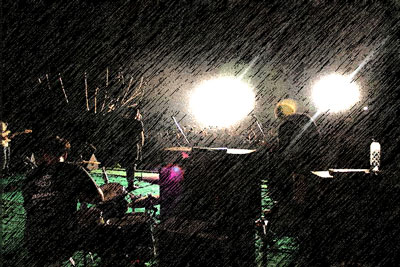Page 1 Page 2 Page 3 Page 4 Page 5 Page 6 Page 7 Page 8

This is where the magazine articles usually take over, painting in painfully broad strokes. Dodge City’s destruction was sensationalized and then forgotten as a tidal wave of flannel washed over the country from the Northwest. Port quit D.C. and opened a guitar store in L.A. Last I heard, he was designing an axe for Gibson. Trent Lincoln took over the band and signed with some third-rate label, only to fail utterly in the face of grunge. Every time his bloated face shows up on basic cable, I get a little satisfaction from knowing that my brother gave him that crooked nose. Jeff and I were questioned, of course, but never made it into the official story. It was obvious to the authorities that Billy had tried to off himself, and the rock mags only wanted the blood and commotion. They didn’t really care what caused it. Their stories end with Billy not quite able to kill himself. Kind of like Rock, if you’re into trite metaphors.
And now, dear readers, you are allowed (nay, expected) to call bullshit. “You’ve been writing about rock music for twenty years,” you say, “and this is the first we’re hearing of this?” Well, yes. Dodge City was long gone before I made my way west, and Billy didn’t exactly burn up the interview circuit once he lost the ability to speak in complete sentences. The only person out there who could paint the full picture of that night is Port, and though he’s had chances, he only talks about Billy’s problems in interviews, and finding him in that bloody shower stall. He may be protecting Jeff and me, or he may want to just be done with it all. I could go ask him, I guess, but that’s never felt like the right thing to do. I suppose if anyone wanted to go dig through the Hamilton County police records, they’d find Jeff’s name, and maybe mine, but that name isn’t the same one you see in my bylines. “But still,” you say, “this is a big deal. The Death of Rock, et cetera.” Maybe it is. Billy failed at what Cobain got right two years later. That’s interesting to people. I get it. Maybe it’s important, but I didn’t want it to be my way in. I wanted to punch that ticket myself. And I eventually did. Wrote for the slicks. Schmoozed with rock stars. Hit the big time. But rock stars aren’t the only ones who burn out. And here I sit in my over-mortgaged basement, writing the story the Times didn’t want. And now that I’ve written it, I’m glad they didn’t. Because it’s not for them. It’s mine. And it’s Jeff’s. And until I sober up and delete it, it’s yours.
And now that you’ve got your hands on it, you probably want a coda. Some final scene that makes sense of it all. But I don’t have that. All I’ve got is the way it really ended, later that night in a Noblesville police station. Jeff and I sat in stiff chairs against a green sheetrock wall while one of the local cops got on the phone with our hometown police. I could hear from her half of the conversation that, even if the night’s events didn’t get Jeff sent up, they weren’t going to help him out with the charges he already faced for stealing those engine parts. But the eight years he would spend in state prison for grand theft aren’t what I think of when I remember that night. Instead, I remember my brother sitting across from the officer, bathed in fluorescence at two in the morning, looking down at his Dodge City shirt, covered with dried blood and grains of shattered glass. He stared at the shirt for a long time. It had always been his favorite, with its stylized picture of swinging tavern doors opened to reveal the band in kickass poses. Port with a sneer on his face, Billy looking too serious. Above the doors, an old-fashioned wooden sign read “Nine Days without a Friday.” Some of the letters were soaked red, and there was a gash across one of the doors, revealing Jeff’s pale chest beneath. He looked over at me, a deep shadow of stubble on his face, no longer the untouchable hero of the previous morning.
“Well shit,” he said. “I think it’s ruined.”

